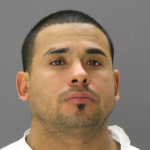 Senior Corporal Geoff Pettay of the Dallas Police Department has protected the Lake Highlands community for years as a police officer for the Northeast Patrol. He knows the faces of the community, and saw just how terrifying it is for women in the neighborhood when a suspected serial rapist is on the loose.
Senior Corporal Geoff Pettay of the Dallas Police Department has protected the Lake Highlands community for years as a police officer for the Northeast Patrol. He knows the faces of the community, and saw just how terrifying it is for women in the neighborhood when a suspected serial rapist is on the loose.
Just six days before the arrest of suspected Lake Highlands rapist Cesar Benitez, Pettay said he remembered the description of a man suspected of peeping in a women’s bathroom last April that Plano police were seeking to arrest. The suspected peeper was arrested one month later for another incidence of peeping in Allen and identified as Cesar Benitez. Allen police charged Benitez with disorderly conduct and set his bond at $1,500.
Which raises the question: Why wasn’t Benitez deported? Could federal immigration authorities have deported Benitez after his arrest in Allen, perhaps preventing the Lake Highlands rapes?
The answer? Probably not.
Under Texas law, peeping is equivalent to a speeding ticket, and rarely involves the federal Immigration and Customs Enforcement (ICE), says Dallas criminal defense attorney and former federal prosecutor John Teakell. Teakell has extensive experience with white-collar and criminal defense cases.
Though it’s easier than ever to deport criminals, Teakell says, they usually must be arrested on state or federal felony charges, and occasionally higher level misdemeanor charges such as assault with bodily injury or prostitution.
In fact, ICE says that only “a limited number of the more than 10 million individuals estimated to be in the U.S. who lack lawful status or are removable because of a criminal conviction. Given this reality, ICE must set sensible priorities.” In February, the Department of Homeland Security allowed hundreds of immigrants convicted of minor offenses in Texas to be released.
In addition, Benitez, through the use of aliases, was able to slip through the cracks in the immigration system. ICE spokesman Carl Rusnok says Benitez was arrested in 2002 and deported to Mexico, but illegally re-entered the U.S. in 2003 under a different name. Since Benitez was arrested on state charges in 2003 under a false alias, he was not referred to immigration officials at that time.
In 2008 ICE upgraded its identification system, called Secure Communities, which helps overcome the problem of multiple aliases. Now local authorities and ICE are able to collaborate by sharing fingerprints to identify illegal immigrants with criminal records. But that was too late to stop Benitez.





